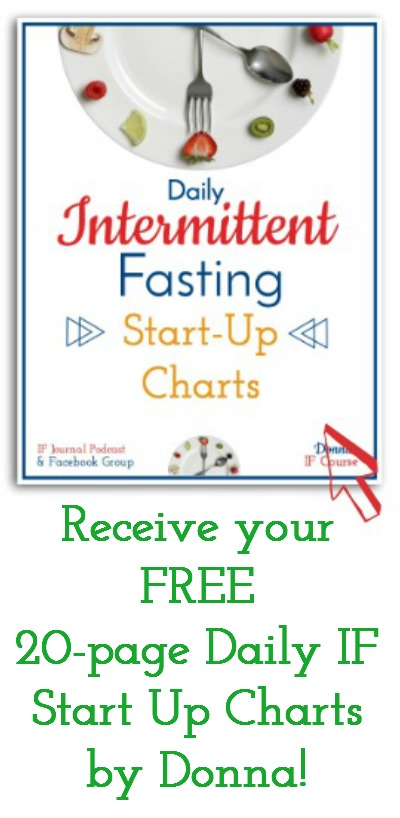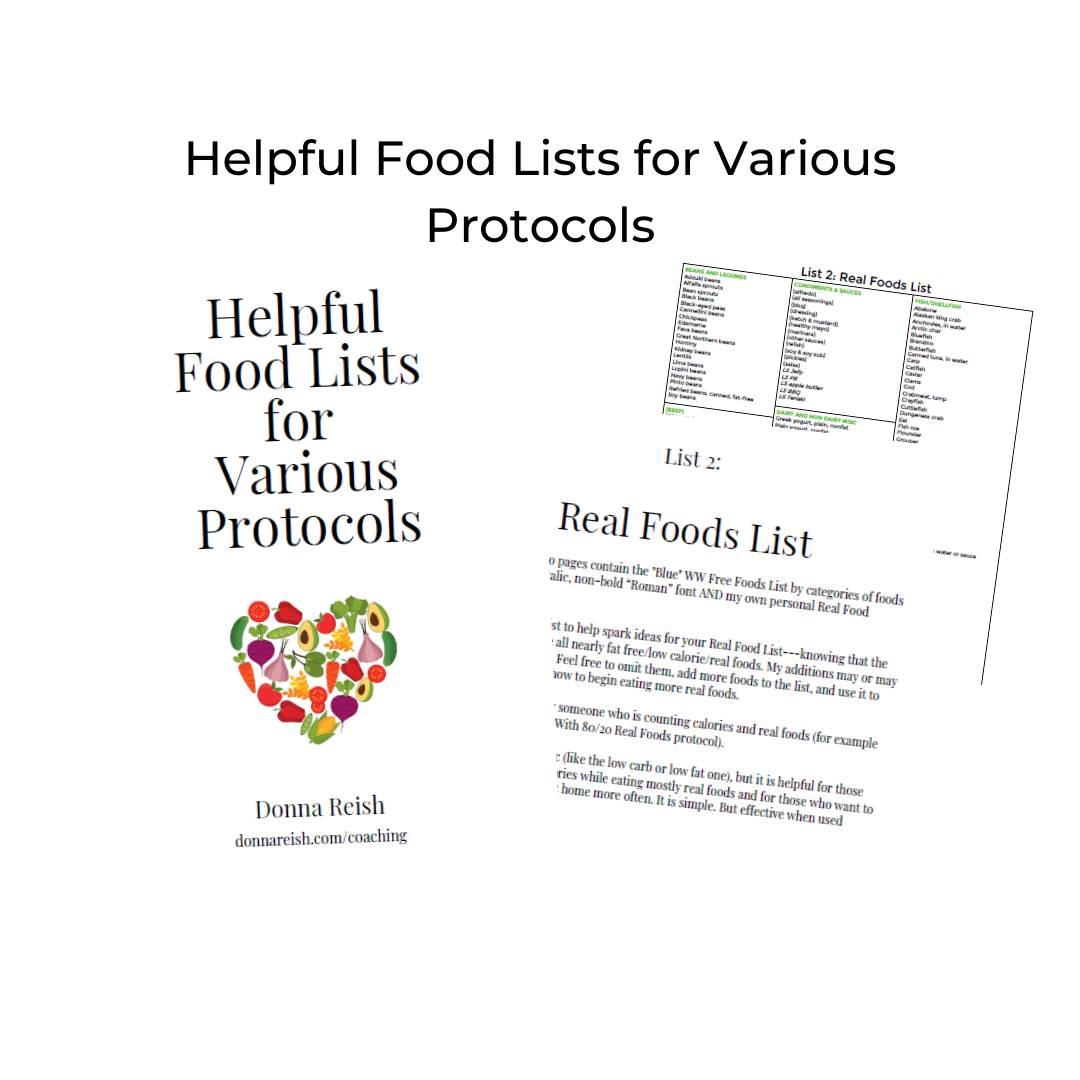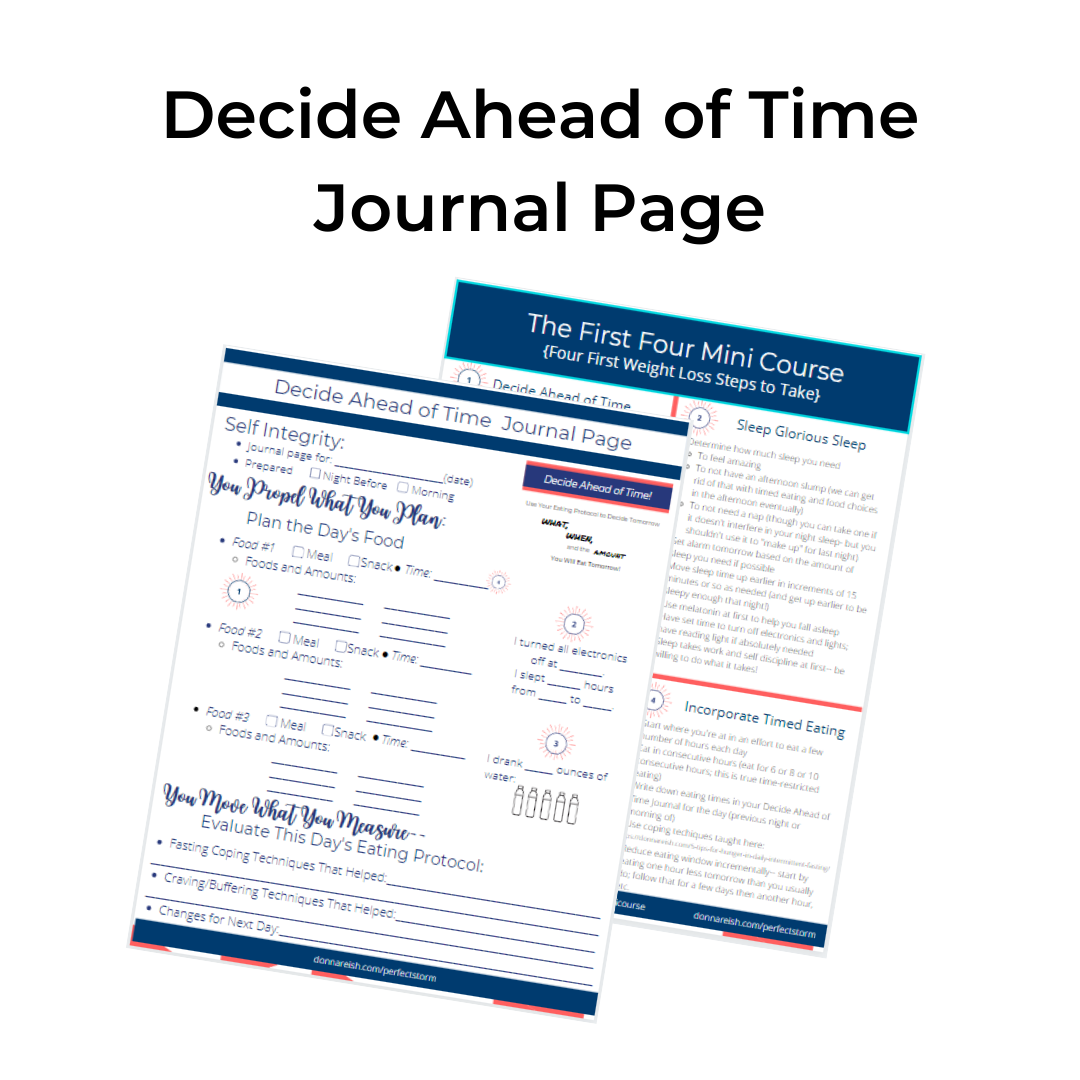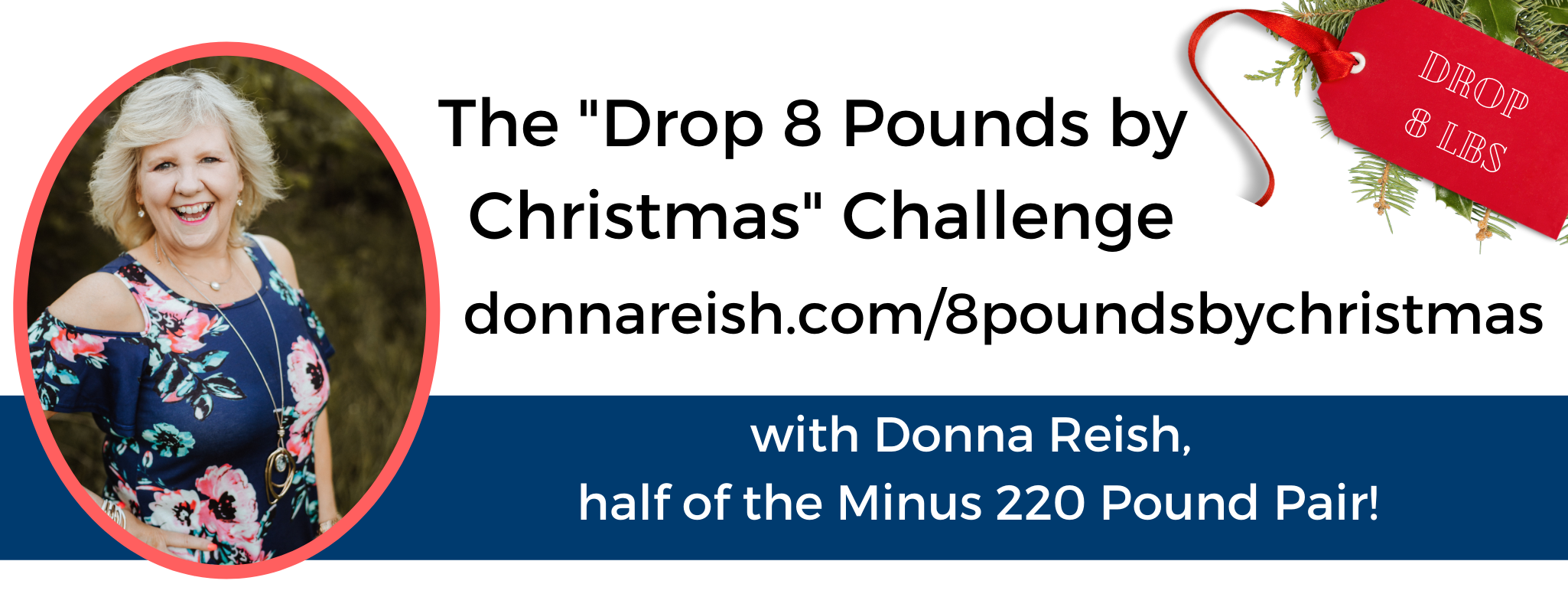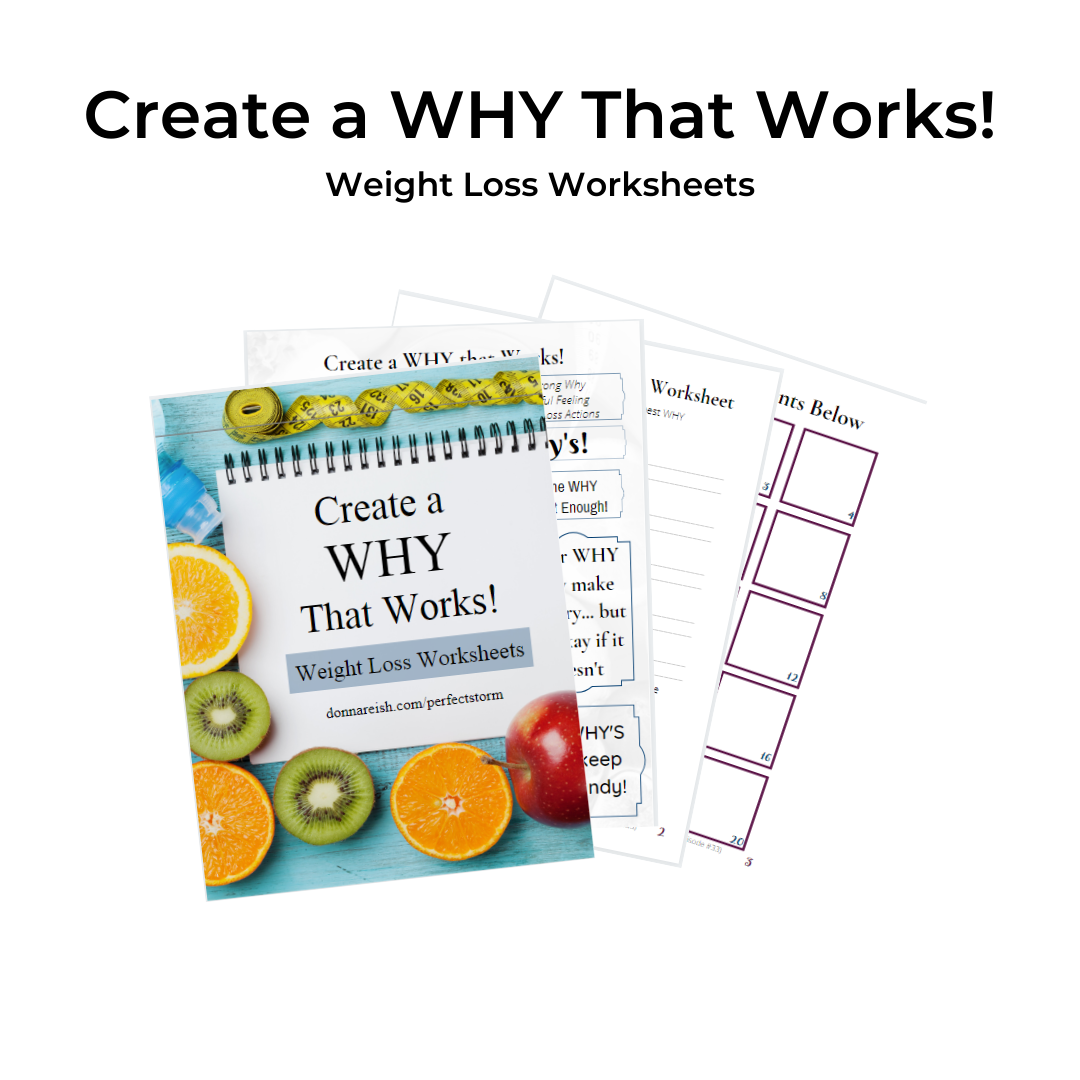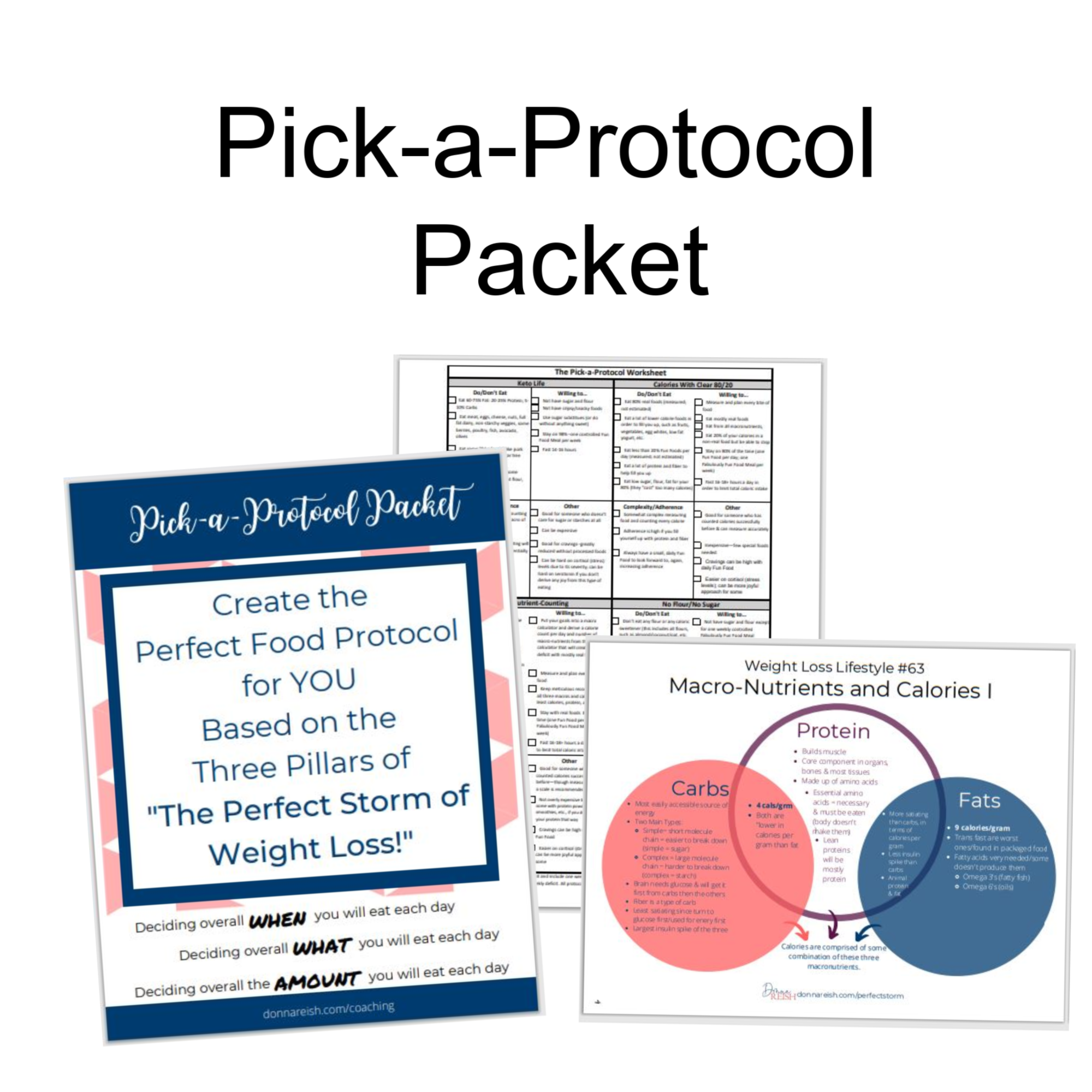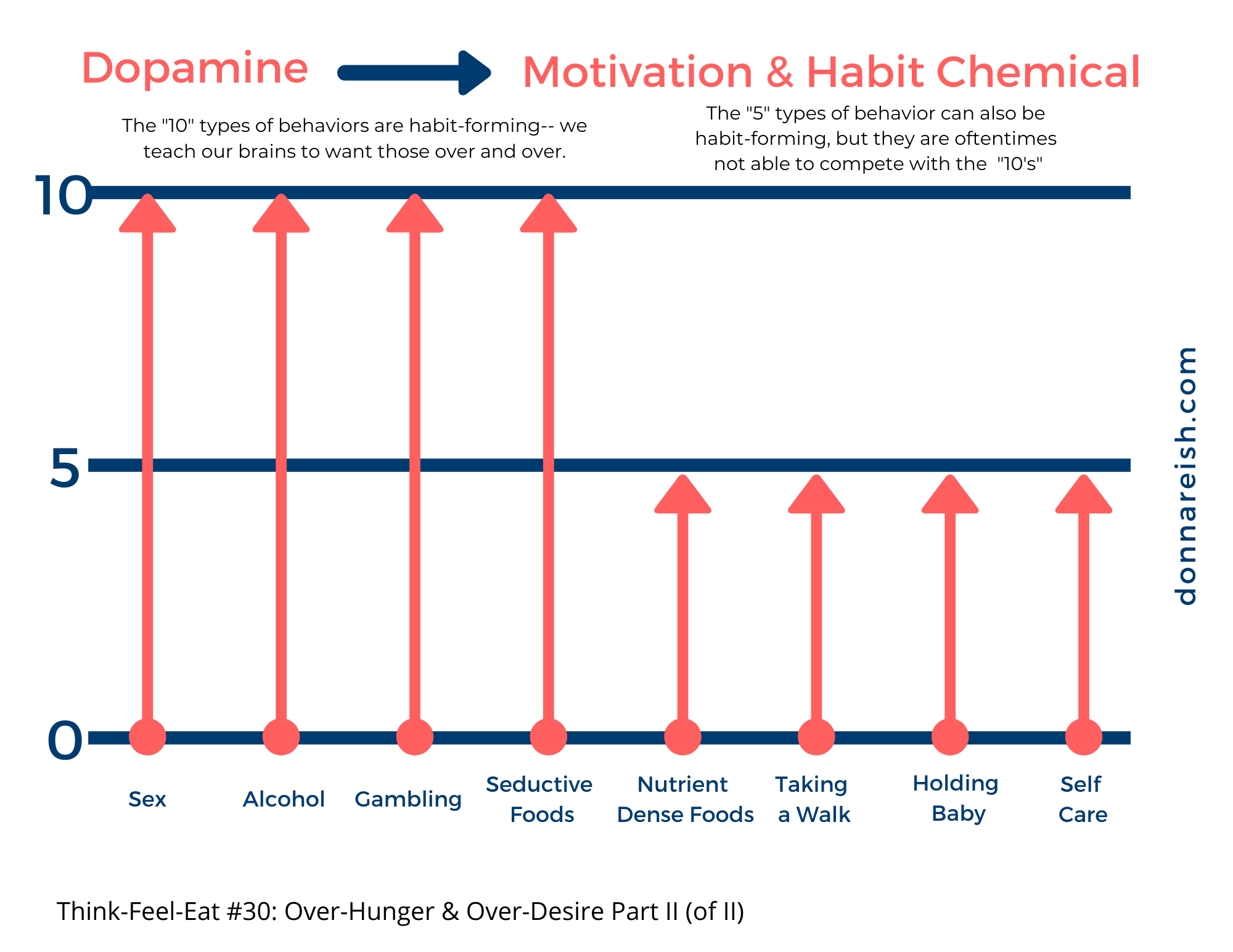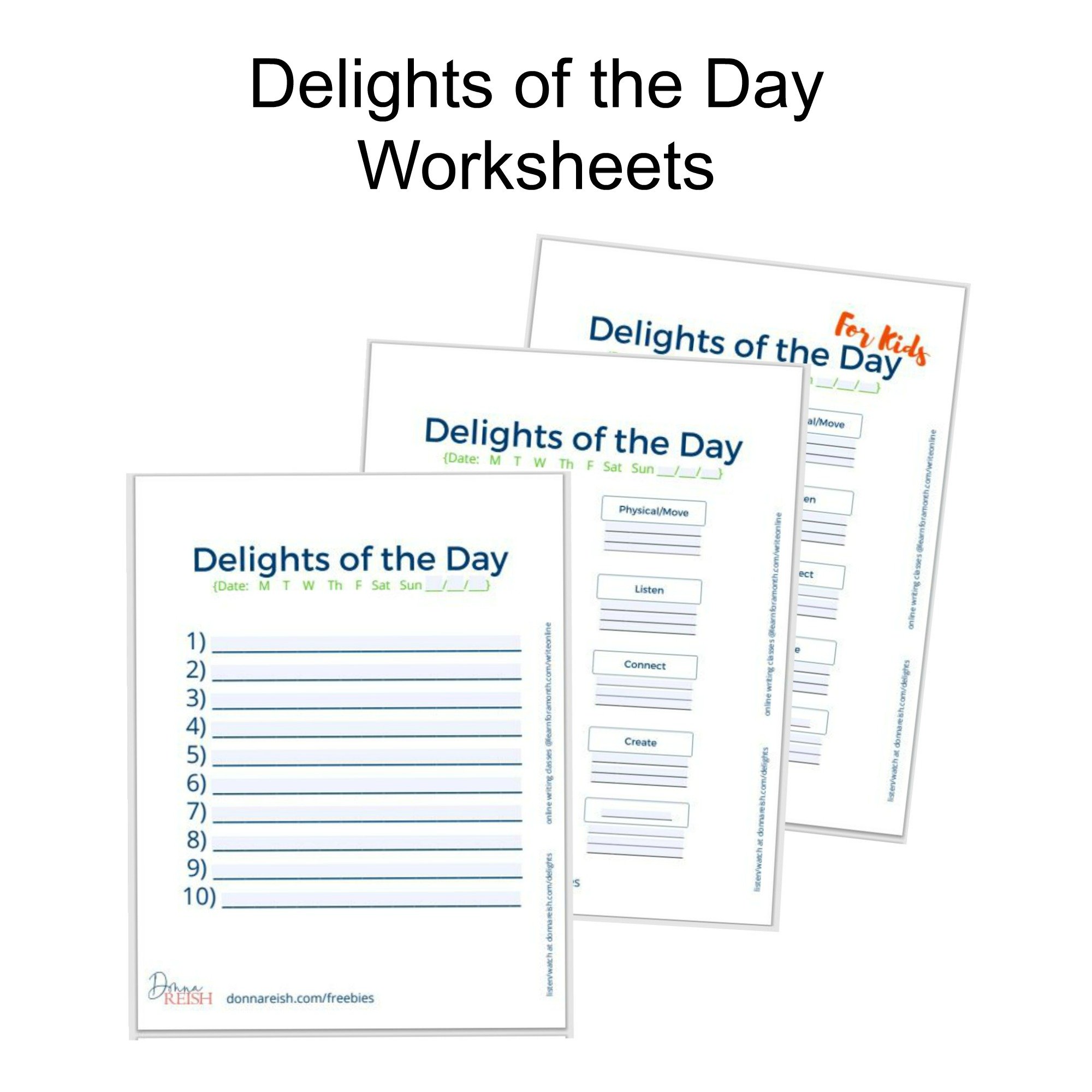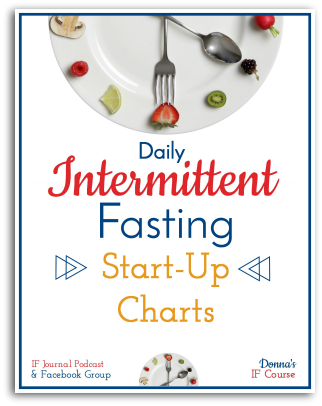Recent Articles

Think-Feel-Eat Episode #34: Effects of Sleep on Weight, Appetite, and Food Control
Hi! I'm Donna Reish, IF teacher, weight loss coach, blogger, and half of "The Minus 220 Pound Pair" as my husband and I have lost over 220 pounds together (160 of that in the past couple of years through the Weight Loss Lifestyle habits and strategies I teach!). In...

Think-Feel-Eat Episode #33: Create a WHY That Works
Hi! I'm Donna Reish, IF teacher, weight loss coach, blogger, and half of "The Minus 220 Pound Pair" as my husband and I have lost over 220 pounds together (160 of that in the past couple of years through the Weight Loss Lifestyle habits and strategies I teach!). In...

Think Feel Eat #32: More of the First Four (First Four Things to Do in Order to Lose Weight)
Hi! I'm Donna Reish, IF teacher, weight loss coach, blogger, and half of "The Minus 220 Pound Pair" as my husband and I have lost over 220 pounds together (160 of that in the past couple of years through the Weight Loss Lifestyle habits and strategies I teach!). In...

Think-Feel-Eat Episode #31: What I Already Know
Hi! I'm Donna Reish, IF teacher, weight loss coach, blogger, and half of "The Minus 220 Pound Pair" as my husband and I have lost over 220 pounds together (160 of that in the past couple of years through the Weight Loss Lifestyle habits and strategies I teach!). In...

Think-Feel-Eat Episode #30: Over-Hunger vs. Over-Desire Part II (of II)
Hi! I'm Donna Reish, IF teacher, weight loss coach, blogger, and half of "The Minus 220 Pound Pair" as my husband and I have lost over 220 pounds together (160 of that in the past couple of years through the Weight Loss Lifestyle habits and strategies I teach!). In...

Think-Feel-Eat Episode #29: Over-Hunger vs. Over-Desire Part I (of II)
Hi! I'm Donna Reish, IF teacher, weight loss coach, blogger, and half of "The Minus 220 Pound Pair" as my husband and I have lost over 220 pounds together (160 of that in the past couple of years through the Weight Loss Lifestyle habits and strategies I teach!). In...

Think-Feel-Eat Episode #28: Eight Fasting Experts on What Breaks a Fast
Hi! I'm Donna Reish, IF teacher, weight loss coach, blogger, and half of "The Minus 220 Pound Pair" as my husband and I have lost over 220 pounds together (160 of that in the past couple of years through the Weight Loss Lifestyle habits and strategies I teach!). In...

Think-Feel-Eat Episode #27: Self-Sabotage III (of III)—More Practical Tips
Hi! I'm Donna Reish, IF teacher, weight loss coach, blogger, and half of "The Minus 220 Pound Pair" as my husband and I have lost over 220 pounds together (160 of that in the past couple of years through the Weight Loss Lifestyle habits and strategies I teach!). In...

Think-Feel-Eat Episode #26: “Self-Sabotage”—Practical Tips (Part II of III)
Hi! I'm Donna Reish, IF teacher, weight loss coach, blogger, and half of "The Minus 220 Pound Pair" as my husband and I have lost over 220 pounds together (160 of that in the past couple of years through the Weight Loss Lifestyle habits and strategies I teach!). In...

Think-Feel-Eat Episode #25: Self-Sabotage in Weight Loss Part I (of II)
Hi! I'm Donna Reish, IF teacher, weight loss coach, blogger, and half of "The Minus 220 Pound Pair" as my husband and I have lost over 220 pounds together (160 of that in the past couple of years through the Weight Loss Lifestyle habits and strategies I teach!). In...

Think-Feel-Eat Episode #24: Our Goal Weight Identity Part II (of II)
Hi! I'm Donna Reish, IF teacher, weight loss coach, blogger, and half of "The Minus 220 Pound Pair" as my husband and I have lost over 220 pounds together (160 of that in the past couple of years through the Weight Loss Lifestyle habits and strategies I teach!). In...

Think-Feel-Eat Episode #23: Goal Weight Identity Part I (of II)
Hi! I'm Donna Reish, IF teacher, weight loss coach, blogger, and half of "The Minus 220 Pound Pair" as my husband and I have lost over 220 pounds together (160 of that in the past couple of years through the Perfect Storm of Weight Loss habits and strategies I...

Think-Feel-Eat Episode #22: The DAILY Ahead of Time Decision That Makes All the Difference for Weight Loss
Hi! I'm Donna Reish, IF teacher, weight loss coach, blogger, and half of "The Minus 220 Pound Pair" as my husband and I have lost over 220 pounds together (160 of that in the past couple of years through the Weight Loss Lifestyle habits and strategies I teach!)....

Think-Feel-Eat Episode #21: One BIG Decision to Make Ahead of Time
Hi! I'm Donna Reish, IF teacher, weight loss coach, blogger, and half of "The Minus 220 Pound Pair" as my husband and I have lost over 220 pounds together (160 of that in the past couple of years through the Weight Loss Lifestyle habits and strategies I teach!). We...

Think-Feel-Eat #20: Tools for Self-Integrity (Part II of II)
Hi! I'm Donna Reish, IF teacher, weight loss coach, blogger, and half of "The Minus 220 Pound Pair" as my husband and I have lost over 220 pounds together (160 of that in the past couple of years through the Weight Loss Lifestyle habits and strategies I teach!). ...
Plexus
Check out the supplements that have changed my life!
Ray & Donna Reish Independent Ambassadors #1382677


Think-Feel-Eat Episode #39: How to Fix Your Sleep Problems (II of II)
Hi! I’m Donna Reish, IF teacher, weight loss coach, blogger, and half of “The Minus 220 Pound Pair” as my husband and I have lost over 220 pounds together (160 of that in the past couple of years through the Weight Loss Lifestyle habits and strategies I teach!).
In this episode, I present the second part of two on how to fix your sleep problems.
Low sleep (under seven hours) has been found to cause an increase in the hunger hormone ghrelin; a decrease in the satiety hormone leptin; a decrease in fat loss (in part due to raised cortisol levels); a lack of impulse control; and more.
How can we skip something that is so amazingly wonderful (oh I love sleep)?
It oftentimes isn’t for lack of wanting!
Going to sleep is as much a discipline problem as getting up. (And if we fix going to sleep we will often fix the getting up part!)
But there are many factors that come into play that cause us not to be able to sleep.
I tackled many of these last week in TFE #38: lifestyle issues; planning your day around light and darkness; moving more at the right times; and more.
In this week’s episode I finish the fix your sleep advice with some of the following areas:
1) Insomnia causes and solutions
2) Insomnia and fasting
3) Caffeine
4) Blue light
5) Magnesium
6) Hunger
I have worked hard on my sleep—literally creating rules and protocols, developing new tiny habits incrementally, and making sure I get my 7.5 hours almost every night. It has made such a big difference for me!
Find all of my episodes, outlines, and articles for my two weekly broadcasts:
Think Feel Eat #39 How to Fix Your Sleep Problems (II of II)
A. Review
1. Effects of too little sleep TFE #34
2. Fix Sleep Problems (Part I): TFE #38
3. Stress and Cortisol
b. #37: Stress and Cortisol II
4. Sleep affects weight loss, hunger, appetite, cravings, satiation, and urges (plus more!)
a. Weight loss hormones ghrelin and leptin—hunger and satiation
b. Decreased fat loss
c. Lack of impulse control
d. Food cue responses
e. Holding on to fat
B. Insomnia General and Fasting
1. General
a. Anything that interferes in circadian rhythms
b. Circadian rhythms control our wake and sleep cycles plus other functions throughout body and brain
c. The “master clock” tells the 37 trillion cells what to do
2. Insomnia and fasting
a. After a couple of days, you should sleep BETTER with fasting
b. When you start burning fat instead of sugar at first, you release a hormone that stimulates wakefulness
c. Insomnia with fasting WILL go away as your circadian rhythms catch up to the new eating times, hunger goes away, your body goes seamlessly into fat burning (rather than that big jump from sugar burning to fat burning each day during the early days of fasting)
d. It will be similar to adapting to a new time zone after flying—but will even out quickly
e. Food affects circadian rhythms’ many clocks—like the sun keeps track of the sleep time, your first bite of food and last bite of food set your new “food” circadian rhythms….so everything might feel out of whack for a couple of days
f. Fasting usually causes more happiness, better mood, and great sleep once you’re into it several days—causing a more pronounced circadian rhythm due to food intake being restricted to certain times of day
g. When your eating is done well before bed, your digestion and food processing is over at bedtime
h. Melatonin is released better when insulin isn’t released—so no food at night causes melatonin to be even stronger; low insulin is linked to higher melatonin and better sleep
C. Causes of Insomnia
1. Caffeine
a. Raises cortisol level–80% of people drink coffee in US
b. Caffeine’s effects on sleep
c. Has half life—at the 4-6 hour mark, you still have half the caffeine in your system
d. Some people seem unaffected but may be affected after all
e. 200-400 mg per day maximum
f. Each medium cup of coffee/most teas have 90-100 mg each
2. Blue light
a. Controls melatonin secretion
b. Artificial blue lights (lightbulbs, computers, devise etc.) all suppress melatonin levels at night when they should be increasing
c. Hungry Brain: “Your body’s 37 trillion cells don’t get the message that it’s nighttime until you turn out the lights—several hours after the sun goes down. This pushes your biological wake-sleep cycle back by a few hours relative to the day-night cycle of the sun, desynchronizing the two.”
d. Thus, time to go to sleep—body isn’t ready; time to get up body isn’t ready.
e. Cortiosol 40% higher in mornings after being exposed to blue light 30 minutes before sleep (even if you slept okay!)
f. Blue light blocking glasses .
3. Magnesium deficiency
a. Leg and foot cramps, muscle cramps, headaches, insomnia, anxiety, and depression or “the blues” are signs of magnesium deficiency
b. Happens during fasting due to mineral imbalances, eating less, etc.
c. Magnesium blocks the release of cortisol in the brain (less stress more sleep!)
d. Magnesium supports the release of melatonin…..more, longer, faster sleep!
e. Get more magnesium!
i. Supplement
ii. Mineral water
iii. Epsom salt baths—do give magnesium but not easily assimilated into the skin layers—might be good for relaxing but don’t count on it to help with a true magnesium deficiency
4. Hunger
a. Especially early into fasting
b. Work on timing your fast to fall asleep before you get hungry at night (I used to end my eating window at 7 or so…now I end it between 8 and 9 so I don’t get hungry from 9 to 11 when I have time to be with my husband/to relax.
c. Satiety vs satisfaction
i. Might need more fat as it will stay in your body longer (satiation)
ii. Might need more carbs for satisfaction or slow carbs for satiation
D. Get More Help!
1. Join our holiday weight loss challenge
2. Join my FREE FB group where I record videocast/podcast episodes!
3. Emails with teaching around weight management—articles, videos, free charts and booklets, and more
4. Take my month-long Intermittent Fasting course
5. Schedule a free 30 minute coaching consult!


Think-Feel-Eat Episode #38: How to Fix Your Sleep Problems (I of II)
Hi! I’m Donna Reish, IF teacher, weight loss coach, blogger, and half of “The Minus 220 Pound Pair” as my husband and I have lost over 220 pounds together (160 of that in the past couple of years through the Weight Loss Lifestyle habits and strategies I teach!).
In this episode, I present the part one of two parts about How to Fix Your Sleep Problems.
In episode #34 of Think-Feel-Eat, I described the negative effects on our weight, belly fat, cravings, hunger, energy, and more that come from sleeping under seven hours a night. (Super interesting studies—go check them out!)
In this episode, part one of two parts on How to Fix Your Sleep Problems, I delve into the Daily Choices that we can make in our lives to influence our ability to fall asleep, stay asleep, and sleep well. (Next week I will look more into insomnia as well.)
This week I describe many daily lifestyle activities and choices that can keep us from sleeping well, including:
- Seeing sleep as a habit and a discipline that we must work on in order to overcome difficulties
- Consistently getting up and going to bed at similar times each day and night
- Movement and light first thing in the morning
- Morning routines
- Nighttime routines
- Working with our daily arousal system and our daily sleep system
- Melatonin
- Working out, exercising, and movement
- Napping and daytime lethargy
- And much more!
Find all of my episodes, outlines, and articles for my two weekly broadcasts:
(1) Weight Loss Lifestyle broadcast (formerly Donna’s Intermittent Fasting Broadcast)
Think Feel Eat #38: How to Fix Your Sleep Problems (I of II)
A. Review of Sleep Deprivation and Weight Issues—see what happens when we don’t sleep in TFE #34!
1. Sleep deprived means more cortisol
a. TFE Stress and Cortisol episodes: TFE #36 and TFE #37
b. Cortisol is a hormone that rises with stress
c. Cortisol causes many issues, including holding onto fat, increasing hunger, increasing cravings, etc.
d. 1-2 hours a day less sleep results in 24-30% more hunger
e. Another study shows those who regularly sleep fewer than seven hours have 26% more hunger than those who sleep eight hours per night
B. Sleep Is Influenced by Daily Choices
1. “A good tomorrow starts tonight!”
2. Going to sleep is a discipline!
3. Bad sleep habits are just that—habits…and can be undone/new habits learned the same way the current ones have been learned!
4. Getting up consistently early
a. Try moving your rising time incrementally by 15-30 minutes a day
b. Get up and open blinds, turn on overhead lights—tell your body it is daytime!
c. Movement is good first thing
d. Morning routines with times help—don’t sit as this is still a tired position.
e. Brain has huge effect on sleep—arousal system that creates wakefulness/alertness, etc., so work with this arousal system
f. Definite arousal system vs. sleep system—they work opposite of each other; when one is active, the other is shut down
g. Must have a strong signal to kick one out of one state and into another.
5. Sunlight and groundedness
a. Getting outdoors will help you sleep better
b. Sunlight first thing in the morning helps with depression, cortisol, serotonin, etc., but also has an effect on circadian rhythms and how you sleep
c. Sunlight helps melatonin cycle so melatonin is reduced in the morning and starts to be released at bedtime better
6. Melatonin
a. Hormone—not just an herb
b. When we can’t make enough of it ourselves, we can supplement with it
c. Take as little as absolutely needed to get the job done!
d. I use dissolvable ones from Amazon as they’re easy to break in two and start working faster since they dissolve
e. We can help our own melatonin production by letting light in first thing/getting light, waking up earlier, winding down in the evenings, etc.
7. Working out
a. Definitely helps you sleep better in the long run as the brain responds to how long you’ve been up, how active you are, etc., causing the sleep cycle/sleep center to start up.
b. Watch for exercise times
i. Morning exercise is thought to help with appetite during the day and sleep later that night
ii. Exercising too late at night can be a problem
1.) Can increase hormones that can keep you awake
2.) Some need to exercise no sooner than two hours before bed
8. No naps if they interfere in your sleep
a. Lounging too much, not enough movement, and sleeping during the day are some of worst offenders for good sleep at night
b. If naps don’t interfere or you absolutely need one, take a 20-30 minute one and don’t lounge afterwards. Move so body knows it isn’t wind down time!
9. Bedtime routine
a. Too much or too early of resting in the evening without movement makes body think it’s time to rest, but we don’t sleep, so it gets our melatonin production and sleep off
b. Lights
c. Same routine
d. Wind down
C. Get More Help!
1. Join our holiday weight loss challenge
2. Join my FREE FB group where I record videocast/podcast episodes!
3. Emails with teaching around weight management—articles, videos, free charts and booklets, and more


Think-Feel-Eat Episode #37: Managing Stress & Cortisol Levels for Weight Control (Part II of II)
Hi! I’m Donna Reish, IF teacher, weight loss coach, blogger, and half of “The Minus 220 Pound Pair” as my husband and I have lost over 220 pounds together (160 of that in the past couple of years through the Weight Loss Lifestyle habits and strategies I teach!).
In this episode, I present second part to Stress—this one offers some solutions!
(Check out Part I where I tell the effects of stress on weight, stomach fat, cravings, and more! Think-Feel-Eat #36!)
In this episode, I first review stress and cortisol and what happens in the body when cortisol is released too much/too often/too long due to stress. Then I move into the big picture look of stress and cortisol, including:
- Developing a life plan that helps you controls your stress (including looking down as an observer of your life, developing habits, building incrementality, convincing your brain that you are creating a stress plan, and more!)
- Understanding stress eating (what I call “Frenzied Food” in the 4 F’s of Food Types—Fuel Food, Fun Food, Frenzied Food, and Fog Food)
- Setting yourself up for food success with barriers, substitutions, and interrupting the stress eating pattern.
Then I move into specific practices that can help us control stress and excessive cortisol release, including sleep, mindfulness/meditation/breathing, exercise, yoga, laughter, nature, and music.
Find all of my episodes, outlines, and articles for my two weekly broadcasts:
(1) Weight Loss Lifestyle broadcast (formerly Donna’s Intermittent Fasting Broadcast)
Think Feel Eat Outline 37: Managing Stress & Cortisol Levels for Weight Control Part II of II
A. Stress and Cortisol Defined
1. Stress
a. Makes fat loss hard
b. Can be anything that threatens our safety, status, well being
c. Can be anything that initiates physical or psychological demands that are above our ability to handle them
d. Can be unpredictable change in environment
e. Can be an inconsistency between our expectations and actual outcomes
f. Can be real or perceived
g. Different for all people
h. Response based on our experiences with that stressor
i. When stress occurs, we have emotional responses
i. Feelings of uneasiness
ii. Impending doom
iii. Rumination/worr
iv. Desire to avoid the stress
j. When stress occurs, we have physiological responses
i. Body bloods with adrenaline and noradrenaline—fight/flight…for a few seconds
ii. When this happens, we respond/rise to the challenge
iii. This is why people are given adrenaline to wake them up, etc. when injured
iv. When we have a stress, we also release cortisol
2. Cortisol
a. Stress hormone that turns into neurotransmitter—turns into “steroids”
b. Slow acting but long lasting
c. Broken down in the body to give energy when needed
d. Helps recovery when emergency is over
e. Suppresses inflammation (i.e. cortisol shots and creams)
f. The stomach has four times the number of cortisol receptors as anyplace else—thus, the belly fat from chronic stress and high cortisol.
3. Stress and cortisol different nowadays than early man
a. Only had cortisol for short periods of time before
b. Now we get stressed frequently and have high cortisol for longer periods, sometimes chronically
4. Ari Whitten, Fat Loss Blueprint
a. Course I have recently taken
b. Learned a lot about stress, cortisol, and sleep from it
c. Many of the studies I refer to here were explained in that course
B. Big Picture Look at Your Stress and Cortisol
1. Not in the middle of your stress—not “during the conflict”
2. Develop a life plan that helps you control your stress
a. Look down as an observer of your life
b. Habits
c. Incrementality
d. A “stress prevention activities” plan
e. If brain thinks you have a plan to deal with stress, it believes you—even if your plan isn’t fully in place!
f. TFE 29 and 30 Over-hunger vs. Over-desire
3. Understand stress eating
a. “Frenzied” eating (TFE #15)
b. Brain becomes habituated to a heightened state of craving foods—this becomes a habit (if we created this habit before, we can create a new habit now!)
c. Set yourself up for food success
i. Food choices/dieting/resisting urges is a stress on top of the stress
ii. Too much restriction causes unnecessary stress
1. Research shows overweight people are more prone to stress eat
2. Research shows that those who overly-restrict are more prone to stress eating
3. Create barriers for these times
a. Barriers
b. Substitutions
c. Interrupt the stress eating pattern
i. Word you use
ii. Clap or tap
iii. Closing something
iv. 5 Second Rule
C. Sleep (Effects of Too Little Sleep on Weight —TFE #34)
1. Sleep loss makes us more emotionally reactive, impulsive, and prone to cognitive deficits that create more stress
2. Chronic stress makes sleeping difficult and worsens the quality of our sleep
3. Focusing on both sleep increasing and stress reduction will benefit both
4. Sleep can be enhanced
a. Morning sun exposure
b. Avoid artificial light at night
c. Sleeping in a cool environment
d. Using melatonin if needed
D. Mindfulness/Meditation/Breathing
1. Train yourself to think differently
a. Visiting WHY often (TFE #3)
b. Doing Thought Work (TFE #1)
2. One meditation session
a. Drops cortisol levels by 20% in a study of medical students
b. Lower cortisol levels correlate with length of time spent meditating
3. Train yourself to think differently through meditation—programs/apps, prayer, gratefulness practices, journaling
4. Breathing
a. Take ten deep breaths before you answer? True!
b. Some say equal inhale and exhale; some say twice as long on exhale as inhale
E. Exercise
1. Exercise is a stress in itself
a. Choose HIIT (fast cortisol recovery), strength training, yoga, walking—if it feels crazy stressful, it probably is!
b. Choose according to how you feel
c. Exercise helps relieve pent up stress
2. Walking
a. Outdoors known for reducing cortisol (and also increasing groundedness)
b. Walking lowers cortisol by up to 18%
i. It is a beneath the surface type of activity so doesn’t cause a compensatory mechanism (making up for high intensity exercise by sitting too much and eventually reducing NEAT (non exercise activity thermogenesis)
ii. Women are more susceptible to compensatory mechanism
iii. Walking doesn’t cause this compensation because it doesn’t send negative signal to the brain since the calorie burning is slower (not losing calories at such a high rate so body doesn’t sense that calories are being burned)
3. Yoga
a. Great way to cope with stress, burnout, and high cortisol
b. Known to reduce perceived stress, anxiety, cortisol levels
F. Other
1. Laughter
a. Considered lifestyle medicine
b. Used for those receiving treatments for cancer, Parkinsons, and more
c. Increases production of endorphins in brain, which leads to a variety of benefits including improved mood and greater life satisfaction
d. Reduces cortisol and stress
e. “Laughter and tears: best medicine for stress.”
2. Nature
3. Music
a. Research shows before and after stressful even—lowers cortisol
b. Relaxing music best
G. Get More Help!
1. Join our holiday weight loss challenge
2. Join my FREE FB group where I record videocast/podcast episodes!
3. Emails with teaching around weight management—articles, videos, free charts and booklets, and more
4. Take my month-long Intermittent Fasting course


Think-Feel-Eat Episode #36: Stress, Cortisol, and Weight Management, Part I of II
Hi! I’m Donna Reish, IF teacher, weight loss coach, blogger, and half of “The Minus 220 Pound Pair” as my husband and I have lost over 220 pounds together (160 of that in the past couple of years through the Weight Loss Lifestyle habits and strategies I teach!).
In this episode, I present Part I of II of Stress, Cortisol, and Weight Mangement.
Turns out, the main factor in weight loss is creating a calorie deficit. That is, we eat more like our new sized body needs.
Turns out, the main factor in creating said deficit is choosing a protocol that you can stick to.
AND…turns out, there are other factors that can slow or hinder weight loss, fat loss, cravings, overeating, the desire to move, and more.
These include sleep (TFE #34) and stress/cortisol, among other things.
I’m excited to be delving into this topic with my listeners/readers. This week I examined what stress and cortisol can do to weight. Next week I will unveil things we can do about stress and high cortisol.
In today’s episode:
1. Stress and cortisol defined
2. Hormones and neurotransmitters
3. Studying stress and cortisol via people with Cushing Syndrome
4. Obesity and cortisol
5. Muscle loss and cortisol
6. Emotional eating—how chronic stress affects appetite
7. Stress eating
Find all of my episodes, outlines, and articles for my two weekly broadcasts:
(1) Weight Loss Lifestyle broadcast (formerly Donna’s Intermittent Fasting Broadcast) https://donnareish.com/intermittent-fasting-journal-index/
(2) Think-Feel-Eat broadcast at https://donnareish.com/think-feel-eat/
Sign up for my free webinar: https://intermittentfastingwebinar.com
Listen to episode at iTunes here: https://podcasts.apple.com/us/podcast/think-feel-eat/id1498498769
Think Feel Eat Outline 36: Stress, Cortisol, and Weight Management, Part I of II
A. Stress and Cortisol Defined
1. Stress
a. Makes fat loss hard
b. Can be anything that threatens our safety, status, well being
c. Can be anything that initiates physical or psychological demands that are above our ability to handle them
d. Can be unpredictable change in environment
e. Can be an inconsistency between our expectations and actual outcomes
f. Can be real or perceived
g. Different for all people
h. Response based on our experiences with that stressor
i. When stress occurs, we have emotional responses
i. Feelings of uneasiness
ii. Impending doom
iii. Rumination/worry
iv. Desire to avoid the stress
j. When stress occurs, we have physiological responses
i. Body bloods with adrenaline and noradrenaline—fight/flight…for a few seconds
ii. When this happens, we respond/rise to the challenge
iii. This is why people are given adrenaline to wake them up, etc. when injured
iv. When we have a stress, we also release cortisol
2. Cortisol
a. Stress hormone that turns into neurotransmitter—turns into “steroids”
b. Slow acting but long lasting
c. Broken down in the body to give energy when needed
d. Helps recovery when emergency is over
e. Suppresses inflammation (i.e. cortisol shots and creams)
f. The stomach has four times the number of cortisol receptors as anyplace else—thus, the belly fat from chronic stress and high cortisol.
3. Stress and cortisol different nowadays than early man
a. Only had cortisol for short periods of time before
b. Now we get stressed frequently and have high cortisol for longer periods, sometimes chronically
4. Ari Whitten, Fat Loss Blueprint
a. Course I have recently taken
b. Learned a lot about stress, cortisol, and sleep from it
c. Many of the studies I refer to here were explained in that course
B. Hormones and Neurotransmitters
1. General
a. Stress hurts our weight loss efforts by taking down our two main communication pathways—hormones and neurotransmitters
b. Neurotransmitters used by nervous system to transmit messages from brain to muscles, glands, etc.
c. Hormones special chemical messengers secreted into blood and travel to give messages
2. Dopamine
a. Motivation and reward
b. Most addictive behaviors controlled by it
c. Plays role in learning, motor control, emotion and executive functions
3.Seratonin
a. Regulates brain development
b. Also has effect on sleep, mood, memory, aggression, and more
4. Stress/cortisol release disrupts serotonin uptake
a. Chronic stress leaves body and brain deprived of serotonin
b. Can also reduce dopamine and cause apathy and less motivation to do what we love
c. Results in vicious loop—chronic stress causes lower levels of serotonin and dopamine; lower levels of serotonin and dopamine can lead to stress
C. Studying Stress and Cortisol
1. Best looked at through chronically elevated cortisol in disease called Cushing Syndrome
a. Cushing causes giant hump between should blades and protruding abdomen (i.e. stomach obesity)
b. They have chronic high cortisol due to disease, not through stress—but we can see results of high cortisol in them since they have consistently high levels
2. High levels of cortisol general results associated with weight
a. Interfere with hormones like growth, thyroid, sex, etc. leading to muscle loss and fat gain
b. Decrease the ability to turn on and burn body fat processes
c. Increase appetite with a high desire for comfort foods
D. Obesity, Cortisol, and Stress
1. Obese people have higher cortisol levels
a. Study of 10,00 adults
b. Relationship between obesity and higher cortisol levels
2. Study from Harvard Medical School
a. Ten years; 1,300 men and women
b. Weight gain and stress for job related stresses high
3. More stress cycle
a. Leads to more cortisol
b. More cortisol leads to more body fat
c. More body fat can lead to more stress again
E. Muscle Loss and Cortisol
1. Cortisol hampers muscle gain/increases muscle loss
a. Hampers protein synthesis so you aren’t processing protein well
b. Increases breakdown of muscle tissues
2. Both of these cause muscle loss—muscle is imperative for metabolism, strength and activity, and aging well
F. Emotional Eating—Chronic Stress Affects Appetite
1. 2016 Study by Health Care Department of Metropolitan Autonomous University
a. Created to observe relationship between obesity, depsression, and emotional eating
b. 1500 people
c. Results: An inability to cope with depressive stress led to emotional eating and greater body weight
2. Online Survey by American Psychological Society in 2007
a. 1,848 adults
b. 43% showed that stress caused them to eat too much
3. Restrained eaters more likely to participate in stress eating
a. High susceptibility to stress-induced eating may be caused by rigid control of eating behavior
b. Flexible control of eating behavior leads to less stress eating
G. Stress Eating
1. General
a. Stress and food scarcity were common for early man
b. Thus, we seek calorie dense, highly palatable foods when stressed for our lives
c. Stress alters brain and motivation pathways that keep us seeking these foods
2. Repeated daily stressors
a. Different than bursts of adrenaline and shorter term cortisol highs for early man
b. Daily stressors keep our cortisol levels up
i. Stress stays high
ii. Brain reward and motivation pathways keep us wanting and searching for hyperpalatable foods
iii. Food is easy to get leading to overweightness
H. Get More Help!
1. Join our holiday weight loss challenge
2. Join my FREE FB group where I record videocast/podcast episodes!
3. Emails with teaching around weight management—articles, videos, free charts and booklets, and more
4. Take my month-long Intermittent Fasting course
5. Schedule a free 30 minute coaching consult!


Think-Feel-Eat Episode #35: Five Ways to Crave Less
Hi! I’m Donna Reish, IF teacher, weight loss coach, blogger, and half of “The Minus 220 Pound Pair” as my husband and I have lost over 220 pounds together (160 of that in the past couple of years through the Weight Loss Lifestyle habits and strategies I teach!).
In this episode, I present five ways to reduce cravings!
In weight loss, we have a tendency to focus a lot on how to handle cravings. We have tricks and tips and techniques that we automatically turn to when we are having cravings or urges for foods that are not on our protocol or that do not lead to weight loss or weight management.
(I have ten ways to sit with urges in a previous TFE #9 episode —-)
But we don’t focus as much on what would even be better than “making it through cravings”—reducing our total number of cravings overall.
(It’s like which is better—treating a headache with pain reliever or realizing you just need to wear glasses so you don’t have the headaches anymore!)
In today’s episode, I present five ways we can reduce our urges and cravings!
Remarkable. I honestly never knew this was possible.
Here are the five things I have found that directly affect my cravings:
1) Decide Food Ahead of Time (See TFE 22!)
2) Substitute foods on protocol for highly palatable foods
3) Make simpler foods
4) Stretch out the instances of hyper-palatable/six seductive cravings types of foods
5) Sleep!
I hope you will listen or watch the episode to change your cravings! (I have a detailed outline with the info from the sleep studies especially.)
Find all of my episodes, outlines, and articles for my two weekly broadcasts:
(1) Weight Loss Lifestyle broadcast (formerly Donna’s Intermittent Fasting Broadcast)
Sign up for my free webinar
Think Feel Eat 35: Five Ways to Crave Less
A. Five Ways!
1. Decide Ahead of Time
a. Write down the night before or the morning of exactly what you will eat for the entire day
b. Don’t write down too little, things you won’t eat, etc.
c. This builds self-integrity
d. Causes us to have food/meals to look forward to/fall back on: “I don’t need this snack right now because at XXX I am having XXX.”
e. TFE Episode 32: More of the First Four
f. Free Daily Decide Ahead of Time Journal Sheet
g. Self Integrity: TFE 19 and TFE 20
2. Substitute foods on your protocol (hopefully less caloric) that do not spike dopamine like 6 Seductive Craving Foods Do
b. Don’t just think of calories or carbs or fat grams—think of what each food does to you in terms of cravings
c. Create a Protocol: TFE 16, 17, and 18
3. Make simple foods
a. Fewer seductive cravings
b. Will start to gain a taste for simple foods
c. Easier, less expensive, more routine (not so elaborate)
d. Protein
i. Fills you up
ii. Boosts metabolism by up to 15%
iii. Spares muscle while you instead lose/burn fat
iv. Helps with cravings
4. Stretch out the instances of hyper-palatability/six seductive cravings types of foods
a. Make food rules—I only eat flour/sugar/fat combinations on these days and/or these times and/or these locations and/or these situations
b. As we stretch out these foods, we crave them less and less
c. “The fewer times we eat XX, the fewer times we crave XX.”
d. The Hungry Brain by Dr. Stephen Guynet
e. 80/20 eating must be measurable in order to work
5. Get Plenty of Sleep!
a. Truly need more sleep!
i. 7-9 hours every night
ii. New mantra—not I need more sleep so I’m not so tired or grouchy or fatigued or stressed….but actually making a connection to sleep and food/weight
iii. New mantra: “I need 7.5 hours sleep a night because I can’t stop overeating!”
iv. New mantra: “Sleep helps curb overeating!”
b. New York Obesity Research center of Columbia University study
i. Study basis: five consecutive nights; nine hours in bed for half; four hours in bed for other half; both slept in lab; monitored with polysomnography (electrodes and wires monitoring brain waves and other sleep indicators)
ii. It was a crossover design—meaning each participant did both sides (good for comparing each person against himself and increases validity of study)
iii. 5th day—allowed to eat whatever they wanted for a day as long as research team weighed and recorded everything
iv. Conclusion: Sleep deprived group ate nearly 300 more calories than the rested ones.
v. Conclusion: “…..sleep restriction increases food intake. It’s as simple as that.”
c. Brain studies show insufficient sleep’s detriments on food choices
i. Same study as above from Columbia University also studied effect on food choices
a.) Brain scans showed that sleep restriction increases the brain’s responsiveness to food
b. ) Parts of the brain associated with food reward were more active in sleep-restricted people (which made them choose more calorie dense, junk foods)
6. Sleep deprivation leads to lack of impulse control (and lack of food control)
a. Researchers have found that economically people who are sleep deprived have something called optimism bias—they think things will work out for them more easily and make poor choices in gambling and other financial decisions.
i. One team studied 50 people to see if this optimism bias affected food decisions also
ii. They had them sleep different amounts and observed their snack habits (very controlled at a center).
iii. Sleepier people munched on more calories AND were more likely to eat food they had rated as delicious and unhealthy
iv. The researcher concluded, “When you have inadequate sleep, you’re probably less likely to live in accordance with your own health goals. You’re less likely to get to bed on time, you’re less likely to go to the gym, and you’re less likely to have your eating behaviors align with your long-term health goals.”
b. Similar research shows that one night of total sleep deprivation reduces the food cue responsiveness—in other words, even one night of sleep deprivation can cause us to abandon our healthy food goals!
B. Next Steps
1. It’s not too late to join the Drop 8 Pounds by Christmas challenge!
a. Join at the blog to get all of the email updates and trainings:
c. Watch the short info video here


Think-Feel-Eat Episode #34: Effects of Sleep on Weight, Appetite, and Food Control
Hi! I’m Donna Reish, IF teacher, weight loss coach, blogger, and half of “The Minus 220 Pound Pair” as my husband and I have lost over 220 pounds together (160 of that in the past couple of years through the Weight Loss Lifestyle habits and strategies I teach!).
In this episode, I present important information about the effects of sleep on weight, appetite, and food control.
I begin with general sleep details, such as the need we have for seven to nine hours of sleep and the fact that it is estimated that 35% of people are sleep-deprived. And something that many people do not understand: we thwart our sleep-inducing signals with many things besides caffeine or blue light; things like sleeping too much during the day, being sluggish or inactive; lying around a lot can all lead to sleep disruption. (We think we need to “rest” because we are tired, but we are potentially messing up our sleep that night.)
Of course, we also have many benefits to adequate sleep (again, 7-9 hours), such as fewer cravings, boost in metabolism, better insulin sensitivity, hunger hormone regulation, lower cortisol (stress hormone) levels, and more.
I shared many in-patient/in-center studies on sleep and its effect on things related to hunger, appetite, and even metabolism. (For a more thorough look at sleep, including this research, how to help yourself sleep better, and more, check out Weight Loss Lifestyle 40, 41, and 42.)
Turns out, when we don’t get enough sleep, we choose more calorie dense, nutrient-poor foods; we overeat in total intake; we eat more sweets; and our metabolism actually slows down!
As one of the researchers in the studies concluded, “When you have inadequate sleep, you’re probably less likely to live in accordance with your own health goals. You’re less likely to get to bed on time, you’re less likely to go to the gym, and you’re less likely to have your eating behaviors align with your long-term health goals.”
Think Feel Eat Outline 34: Effects of Sleep on Weight, Appetite, and Food Control
A. Introduction
1. Two Episodes: #34–Sleep; #35–Stress
2. It’s not too late to join the Drop 8 Pounds by Christmas Challenge!
a. Join the blog to get all the email updates and trainings!
c. Watch the short video here:
B. General Sleep
1. Deep details of sleep, circadian rhythms, helping your body go to sleep, effect of sleep on hormones, etc. in Weight Loss Lifestyle 40, 41, and 42
2. Need 7-9 hours a night
3. According to Centers for Disease Control and Prevention, 35% of people are sleep deprived!
4. 29% of adult Americans get six hours or fewer per night (22% in 1985)
5. Over 9 hours for people over the age of 18 often results in depression (or may indicate a sign of existing depression).
6. Causing ourselves to go to sleep
a. We have sleep-inducing signals that accumulate in the brain the longer we are awake, the harder we work, and more we exert ourselves, etc.
b. We often thwart this system with caffeine, blue light, too little activity, staying in a slow state (i.e. laziness), sleeping too much during the day, etc., so that the signal is not perceived as “off” and “on” anymore.
C. Benefits of Adequate Sleep—7-9 Hours
1. It leads to fewer cravings
2. It provides a boost in metabolism
3. It gives you better insulin sensitivity
4. Leads to more regulating of hunger hormones (ghrelin and leptin)
5. Helps you have better workouts
6. Way less stress hormone (cortisol—a hormone that increases hunger and cravings, and much more!)
D. Detriments of Inadequate Sleep
1. Inadequate sleep has been shown in study after study to negatively affect weight management
a. Sleeping six hours or fewer affects ghrelin and leptin (hunger and satiation hormones)
i. Studies show that sleeping under six hours results in lower leptin levels, higher ghrelin levels, and a distinct trigger in the brain requiring more food.
ii. One study showed that just sleeping one to two hours less caused a 24-30% increase in hunger
iii. Another study showed that people who regularly sleep fewer than seven hours have 26% more hunger than people who sleep closer to eight hours per night.
2. Decreased fat loss
a. A study on obese women at the same caloric intake had great fat loss until they divided the groups in two and the second half reduced their sleep
b. Sleep deprived group had half the fat loss from that point on from the other group (with no caloric or energy expenditure changes)
c. Research shows a 55% reduction in fat loss for sleep-deprived people.
3. Brain studies
a. New York Obesity Research center of Columbia University study
i. Study basis: five consecutive nights; nine hours in bed for half; four hours in bed for other half; both slept in lab; monitored with polysomnography (electrodes and wires monitoring brain waves and other sleep indicators)
ii. It was a crossover design—meaning each participant did both sides (good for comparing each person against himself and increases validity of study)
iii. 5th day—allowed to eat whatever they wanted for a day as long as research team weighed and recorded everything
iv. Conclusion: Sleep deprived group ate nearly 300 more calories than the rested ones.
v. Conclusion: “…..sleep restriction increases food intake. It’s as simple as that.”
b. Brain studies show insufficient sleep’s detriments on food choices
i. Same study as above from Columbia University also studied effect on food choices
a. Brain scans showed that sleep restriction increases the brain’s responsiveness to food
b. Parts of the brain associated with food reward were more active in sleep-restricted people (which made them choose more calorie dense, junk foods)
c. Brain studies show insufficient sleep’s detriments on metabolism
i. Same study from Columbia University
ii. Went on to study the “lipostat”—that part of the brain that tells the body how much food it needs
iii. Sleep deprived people are told by their brain that they need more food—more energy (probably because of underlying fatigue)
iv. Lipostat thinks you need more energy, signals the food reward part of the brain to tell you to eat more/get more energy
4. Sleep deprivation leads to lack of impulse control (and lack of food control)
a. Researchers have found that economically people who are sleep deprived have something called optimism bias—they think things will work out for them more easily and make poor choices in gambling and other financial decisions.
i. One team studied 50 people to see if this optimism bias affected food decisions also
ii. They had them sleep different amounts and observed their snack habits (very controlled at a center).
iii. Sleepier people munched on more calories AND were more likely to eat food they had rated as delicious and unhealthy
iv. The researcher concluded, “When you have inadequate sleep, you’re probably less likely to live in accordance with your own health goals. You’re less likely to get to bed on time, you’re less likely to go to the gym, and you’re less likely to have your eating behaviors align with your long-term health goals.”
b. Similar research shows that one night of total sleep deprivation reduces the food cue responsiveness—in other words, even one night of sleep deprivation can cause us to abandon our healthy food goals!
D Work With Me!


Think-Feel-Eat Episode #33: Create a WHY That Works
Hi! I’m Donna Reish, IF teacher, weight loss coach, blogger, and half of “The Minus 220 Pound Pair” as my husband and I have lost over 220 pounds together (160 of that in the past couple of years through the Weight Loss Lifestyle habits and strategies I teach!).
In this episode, I present how we can create a weight loss why that works!
If you have spent any time at all in weight loss, self-development, entrepreneur, or goal setting, you have probably heard the importance of having a WHY in your life to help you meet your goals.
Because of this, many of us have worked on some WHY statements through the years. We write down grandiose ideas that we think will somehow magically move us when we are having a tough time staying on our weight loss plan. Then we don’t understand why those statements aren’t working.
Many times our WHY isn’t helping us because it is too vague, too unbelievable to us, too grandiose, too far away, too cumbersome to remember, or too disconnected from our daily weight loss efforts.
In this episode, I teach how you can create a WHY that works—Understand…
1) A WHY is a Thought…and a Thought leads to a Feeling and a Feeling leads to an action.
2) A strong WHY will take you back to your goals.
3) It’s okay if your best WHY seems vain! It’s okay to want to look great.
4) A WHY should help you take the next best step.
5) Your WHY doesn’t have to be noble.
I provide an amazing workbook that has a Q and A section that will help you come up with at least 20 WHY’s—so that you can pull out the right one for the job at the right time!
These include questions like Why do I want to lose weight? How will I feel when I reach my goals? What will change when I reach my goal? And more..
Also included in the workbook is a sample of my page of answering the questions and some of my best WHY’s (for me!).
I want so many good things for you! I know that finding your WHY will help!
Find all of my episodes, outlines, and articles for my two weekly broadcasts:
(1) Weight Loss Lifestyle broadcast (formerly Donna’s Intermittent Fasting Broadcast)
A. Introduction
1. We need a strong WHY in order to stay on our protocols!
3. Join us at the “Drop 8 Pounds by Christmas” challenge!
a. Join at the blog to get all of the email updates and trainings
c. Watch the short info video here!
B. Thoughts About Creating a WHY That Works
1. A Why is a thought… A thought leads to a Feeling… A Feeling leads to an action…
2. Think: Strong Why– Feel: Helpful Feeling — Act: Weight Loss Actions!
3. A strong WHY will tak you back to your goals!
4. One WHY isn’t enough!
5. Create at least 20 Why’s.
6. A Why isn’t to give you warm fuzzies, a why is to make you pause…and make a good decision… take the best path for your weight loss…
7. It’s okay if your best why seems vain! It’s okay to look great!
8. Your why doesn’t have to be noble.
9. Your why may make you cry… but it’s okay if it doesn’t
10. Write your best why’s over and over — keep your best one’s handy!
C. Questions to Ask to Find 20 WHY’s (See my sample worksheet filled in here!)
1. Why do I want to lose weight?
2. How will I feel when I reach my goal?
3. How will I look when I reach my goal?
4. What will change when I reach my goal?
5. What gets you excited about your goal weight?
D. Closing
1. Put your WHYs where you’ll see them
2. Make them short and snappy enough to remember them
3. Use the right one for the job!


Think Feel Eat #32: More of the First Four (First Four Things to Do in Order to Lose Weight)
Hi! I’m Donna Reish, IF teacher, weight loss coach, blogger, and half of “The Minus 220 Pound Pair” as my husband and I have lost over 220 pounds together (160 of that in the past couple of years through the Weight Loss Lifestyle habits and strategies I teach!).
In this episode, I present the First Four steps of weight loss.
When we set out to lose weight, we often want to “do it all.” We want to make all the changes and do every single thing that will cause us to “lose weight fast.” But we usually find that we can’t sustain all of those changes all at the same time—and we often find ourselves going too low in something to continue, so we give up.
Habit formation teaches us that these “all or nothing” approaches usually do not work—and seldom last if they do work.
So enter The First Four—four easy-to-implement, yet still effective steps in the right direction for life-long weight loss.
These four steps are
Number 1: Decide ahead of time for food
Number 2: Monitor sleep
Number 3: Drink water
Number 4: Time your eating
They are effective because they work on specific key areas of weight management:
1) Help in controlling total intake—through timed eating, sleeping enough, filling up with water, deciding ahead of time what we will eat (which helps us with cravings and overeating)
2) They help us burn more calories
3) They help us with cravings
4) They help us by causing us to use our pre-frontal cortex for decisions rather than using our “toddler brain” to decide on things in the moment
5) So much more!
Additionally, when we implement steps that are completely doable, we start to build habits—not just short term solutions.
AND…. Success breeds success. As we are successful in the First Four, we will develop confidence and have success in harder areas!
Grab my handout/daily journal page (two to three minutes a day!) to make the First Four YOUR first four!
Find all of my episodes, outlines, and articles for my two weekly broadcasts:
(1) Weight Loss Lifestyle broadcast (formerly Donna’s Intermittent Fasting Broadcast)
Sign up for my free intermittent fasting webinar
Think Feel Eat 32 More of the First Four (First Four Things to Do in Order to Lose Weight)
A. Weight Loss Decisions
1. Weight loss is not one BIG decision (though Picking Your Protocol is ONE big decision but you can change it as needed)
a. It is a series of little decisions that we make over and over again
b. It is a series of little life-changing decisions (we eventually change sooo many things to make weight loss our lifestyle)
c. Almost every time we gain weight or lose weight, it is because we have made a decision either ahead of time (or with willpower in the moment) or we have made a decision in the moment without willpower.
2. In the Perfect Storm, we start with the FIRST FOUR
a. Four decisions that are easy to make
b. Four things to implement that are not hard
c. But four things with huge impacts on weight loss
d. Four things that we want to develop habits of while they are easy
B. Willpower Gap—See Weight Loss Lifestyle 60 and 61
1. Research shows that we spend four hours a day resisting temptations and have up to 120 food-related decisions a day.
2. We simply don’t have the willpower for that! Thus, we have a willpower gap.
C. Decisions Ahead of Time
1. Pre-frontal cortex
a. Unaffected by emotions, willpower, cravings, etc.
b. The planning part of our brain
c. The part that has our best interest in mind
d. The part that cares about our future self
2. Decisions in the moment are made with our primal brain
a. Avoid discomfort
b. Seek happiness and immediate gratification
c. Toddler brain
3. First Four Decisions for Weight Loss: Decide ahead of time! (Free Journal Sheet!)
a. Number 1: Decide ahead of time for food
b. Number 2: Monitor sleep
c. Number 3: Drink water
d. Number 4: Time your eating
D. Join the Drop 8 Pounds by Christmas challenge! Join today—we start on October 1st!
a. Join at the blog to get all of the email updates and training
Watch the short info video here:


Think-Feel-Eat Episode #31: What I Already Know
Hi! I’m Donna Reish, IF teacher, weight loss coach, blogger, and half of “The Minus 220 Pound Pair” as my husband and I have lost over 220 pounds together (160 of that in the past couple of years through the Weight Loss Lifestyle habits and strategies I teach!).
In this episode, I present ten things that I know for sure! (And I encourage you to consider what you already know for sure as well!)
We know more than we think we know!
This is what I tell my sixty kindergarten through twelfth grade students every day! It is only in realizing what we know that we can see how that information can help us. And so it is with weight management, health, fitness….all of it.
In this episode, I discuss ten things that I know for sure—and elaborate on how these things are helping me reach my goals.
Here are a few of them!
1) I know for sure that when I have sugar more than a couple times a week, my eating is way harder to control.
2) I know for sure that when I fast under seventeen hours, I have too many eating hours.
3) I know for sure that I can’t beat myself up down to my goal weight. (See Think Feel Eat #2 and #3 for details on this one!)
4) I know for sure that my Thoughts cause my Feelings….and my Actions are based on those Feelings. Bottom line: Control my Thoughts, control my Actions! (See Think-Feel-Eat #1 for details on this one!)
5) I know for sure that I can’t outrun a fork. It takes unbelievable amounts of exercise to counteract overeating.
6) I know for sure that I only lose weight by eating less food than my body size currently needs/eating the amount of food that is closer to my goal weight. Period. How I make this happen is still somewhat unknown as I get closer to goal (the exact protocol that makes this happen consistently).
Let’s know what we already know…and use it. Let’s learn more so that we can reach our goals!
Join the Drop 8 Pounds by Christmas challenge today—we start on October 1st!
a. Join at the blog to get all of the email updates and training
Watch the short info video here
Find all of my episodes, outlines, and articles for my two weekly broadcasts:
(1) Weight Loss Lifestyle broadcast (formerly Donna’s Intermittent Fasting Broadcast)
Sign up for my free webinar: https://intermittentfastingwebinar.com
Think Feel Eat Outline 31 What I Already Know
A. Things I Already Know for Sure!
- I know for sure that when I have sugar more than a couple times a week, my eating is way harder to control.
- I know for sure that when I fast under seventeen hours, I have too many eating hours.
- I know for sure that I can’t beat myself up down to my goal weight. (See Think Feel Eat #2 and #3 for details on this one!)
- I know for sure that my Thoughts cause my Feelings….and my Actions are based on those Feelings. Bottom line: Control my Thoughts, control my Actions! (See Think-Feel-Eat #1 for details on this one!)
- I know for sure that I can’t outrun a fork. It takes unbelievable amounts of exercise to counteract overeating.
- I know for sure that I only lose weight by eating less food than my body size currently needs/eating the amount of food that is closer to my goal weight. Period. How I make this happen is still somewhat unknown as I get closer to goal (the exact protocol that makes this happen consistently).
- I know for sure that 80/20 eating only works when it is REAL and measured (not estimated). (See Think-Feel-Eat #15 for more on this!)
- I know for sure what it takes to maintain my 100 pound loss from the last decade. I’ve been doing it for months—it isn’t easy, but I know how to do it!
- I know for sure that certain foods trigger me to overeat. I know what these are.
- I know for sure that when I plan my food ahead of time each day, I am more likely to stay on it!
B. NEW! Free Weight Loss Challenge Group! Starting October 1st!
1. Drop 8 Pounds by Christmas!
2. Continual trainings!
a. Weekly formal videos sent via email
b. Live Q and A Sessions in the FB group
c. Pop up video trainings in the FB group
d. Weight loss coaching
e. Tools, tricks, and more!
f. Help with emotional eating
g. Thought work- Think-Feel-Eat!
h. Accountability threads in the FB group
3. Join today—we start on October 1st!
a. Join at the blog to get all of the email updates and trainings
b. Join the FB group!
4. IF Course for October! Starts October 6th! Intermittentfastingcourse.com

Think-Feel-Eat Episode #30: Over-Hunger vs. Over-Desire Part II (of II)
Hi! I’m Donna Reish, IF teacher, weight loss coach, blogger, and half of “The Minus 220 Pound Pair” as my husband and I have lost over 220 pounds together (160 of that in the past couple of years through the Weight Loss Lifestyle habits and strategies I teach!).
In this episode, I present Part II (of II) of Over-Hunger vs. Over-Desire with an emphasis this week on Over-Desire then looking at solutions for BOTH.
I’m so excited to bring you more OVER info! I dig in this week with a review of the two OVERS—starting with Over-Hunger (true stomach hunger, ghrelin, regulating hunger during the fast, affects satiation or “satedness” (fullness).
Then I review Over-Desire (desiring a certain food or food type oftentimes without hunger, desiring certain foods even when we are full, created by giving in to cravings frequently, also influenced by food memories).
Next. I move into dopamine spikes (See also TFE 7, 8, and 9 for teaching, charts, and Urge Map!). I teach dopamine as a motivation/habit chemical and use a helpful chart to teach dopamine from OVER behaviors and foods vs. dopamine release from simple pleasures. Of course, I help you see how to change your dopamine spikes from high calorie, seductive foods too!
Lastly, I bring Over-Hunger and Over-Desire together, showing the behaviors and tricks that can actually influence both at the same time! (More self-improvement bang for your effort-buck!) These include the 3 F’s, intermittent fasting, sleep, higher protein, reducing highly-palatable foods, and watching for vanishing calorie density foods.
Find all of my episodes, outlines, and articles for my two weekly broadcasts:
(1) Weight Loss Lifestyle broadcast (formerly Donna’s Intermittent Fasting Broadcast)
Sign up for my free webinar: https://intermittentfastingwebinar.com
Think Feel Eat 30: Over-Hunger vs. Over-Desire (Part II of II)
A. Over-Hunger vs. Over-Desire Review
1. Over-hunger is when we have true stomach hunger—the “growling ghrelin gremlins” are telling us our food is low. (See later.)
a. At end of our fast
b. When we eat a small amount when we open our eating window and then have hunger soon after.
c. When we haven’t regulated hunger during the fast yet.
d. When we haven’t figured out our best fasting time and we can’t sleep at night because of hunger.
2. Over-desire is when we desire food, often without hunger and usually certain types of food.
a. Has nothing to do with hunger.
b. Can eat these desired foods even if we are full.
c. Usually created by giving in to cravings so frequently or by not controlling seductive foods.
d. Not as affected by fasting as hunger is.
3. Each one affects a different part
a. Over-hunger is affected by satiation—when we are not sated or satiated (i.e. full), we can have more hunger
b. Over-desire is affected by satisfaction—when we are not satisfied with our food choices, we have more desire for certain foods
4. Similarities
a. They both cause the same final outcome: over-eating resulting in weight gain.
b. They can both be controlled quite a bit through strategic actions. (See The Perfect Storm of Weight Loss!)
B. Over-Desire
1. General “tricks”
a. While some tricks work for both over-hunger and over-desire, over-desire is based on food tastes, memories, hyper-palatability, dopamine spikes, etc.—not stomach space.
b. Over-hunger tricks like filling stomach with 3 F’s, drinking water, fasting so you don’t have to contend with hunger very long each day, etc., do not affect over-desire so much.
c. You know it’s over-desire and not over-hunger when it is food or food-type specific—just filling your stomach with anything won’t work.
2. Dopamine spikes
a. Craving teaching explains a lot (TFE 7, TFE 8, and TFE 9—charts and free Urge Map included!!)
b. Associated with hyper-palatable, seductive foods
1. Different foods and food types for different people (six main ones—sugar, flour, fat, salt, protein, meaty flavors like soy/bone broth, etc.)
2. Can also be textures
3. Can also be memories
3. Understand how dopamine works (dopamine spike chart)
a. Not a reward as much as a motivation/habit
b. Can happen before you ever take the first bite—just the thought of that food, that memory, that result, that situation—this is what makes it motivating/habitual
c. Hyper-addictive foods and activities release high amounts of dopamine
d. Lower, simple pleasures release low amounts of dopamine
e. Nutrition from food releases dopamine in the stomach—but later than the spikes from the brain that are more intense
f. Simple pleasures equal simple rewards
4. Tips to change your dopamine spikes from high calorie, seductive foods
a. Spread out the instances of them
b. Reduce the number of seductive elements in your treats—animal crackers instead of Oreos; sugar free frozen yogurt instead of full fat, sugary ice cream, simple nacho at home instead of loaded from restaurant—these will save calories but they will also decrease the dopamine spikes since fewer of the six elements will be combined
c. Watch for yours!!! Dove milk chocolate, sugared cereal in milk, homemade baked goods, cream filled donuts, pastries….I know mine!
d. Plan your simple pleasures! (Delights of the Day)—research shows that looking forward to something can bring the same or nearly the same reward as the action itself; you will have that simple pleasure to turn to.
C. Things That Affect Over-Hunger AND Over-Desire
1. 3 F’s—fluffy, fibrous, fluidy
a. Fill up stomach for hunger
b. Usually real, less dopamine spiking
2. Fasting
a. Only have hunger 5-8 hours a day
b. Lowers insulin/hear leptin better so fewer cravings
3. Sleep
a. Lowers hunger
b. Keeps cravings lower/you don’t have so many inhibitions/giving in to hyper-palatable foods
4. Eating higher protein (.8 to 1 gram per pound of body weight)
a. Stays in stomach/most satiating macros
b. Pushes out other foods when you try to get the right amount of protein
c. Real food for both hunger and cravings/over-desire
5. Vanishing Calorie Density
a. Food scientists create foods to melt in your mouth and essentially signal the brain that you’re not eating as much as you really are
b. These food disappear in your mouth and you often feel like you didn’t eat anything at all
c. Takes soooo much of these foods to satiate/sate you; takes more and more to get the reward from the food
d. Evaluate which foods are vanishing calorie density foods for you
D. Next Steps
1. Intermittent Fasting Course—first Monday of each month; use code SAVE20 to get $20 off—see you in September!
3. Perfect Storm of Weight Loss


Plexus
Check out the supplements that have changed my life!
Ray & Donna Reish Independent Ambassadors #1382677
Contact Me!
Character Ink Press
Downloadable lessons, Language Arts curriculum, Character Training tools & more!
Plexus
Check out the supplements that have changed my life!
Ray & Donna Reish Independent Ambassadors #1382677










